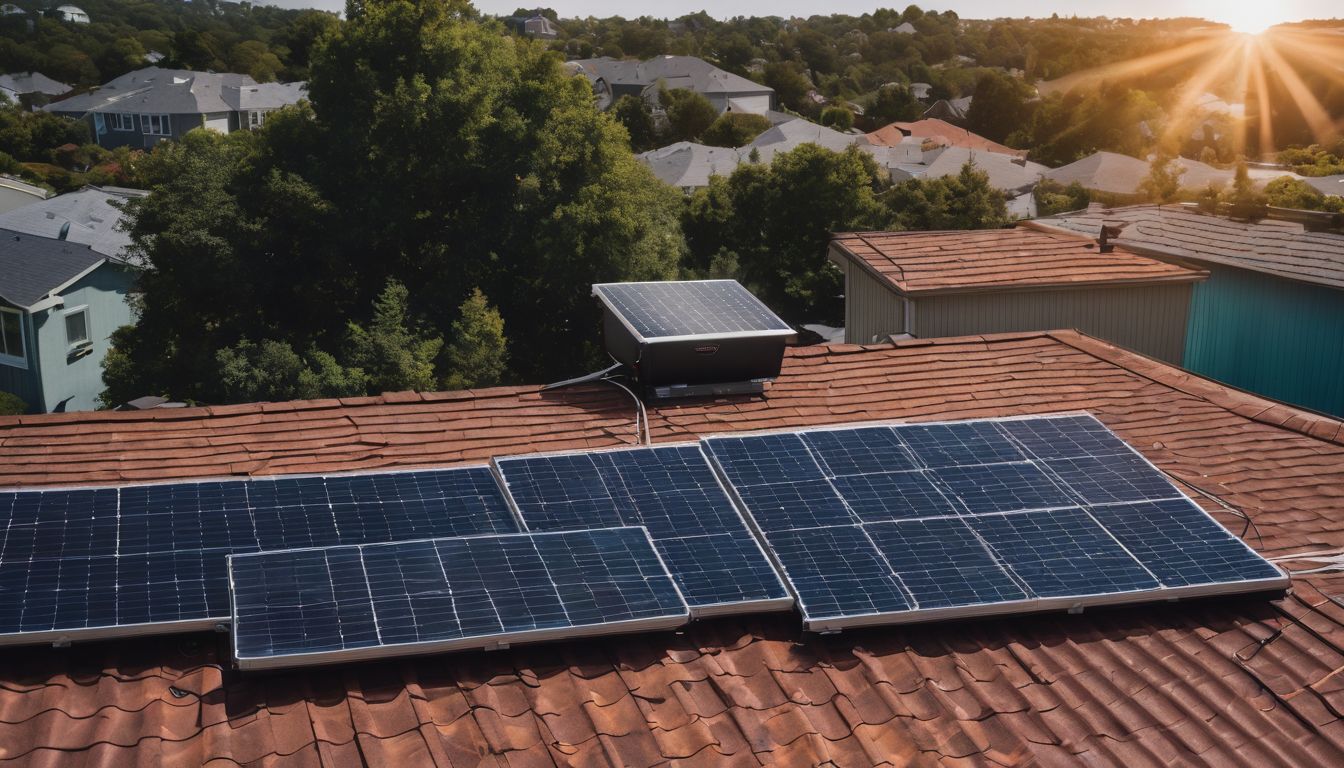Deciding to switch to solar power is exciting, but the costs can be daunting. In fact, there’s a wide array of grants and incentives that make solar more affordable. This article will guide you through finding and applying for these financial aids, ensuring you don’t miss out on savings.
Let’s shine some light on the subject!
Key Takeaways
- Homeowners can lower the cost of solar panel installation through state and utility company rebates, federal tax credits, and installer or manufacturer incentives.
- Participating in net metering programs allows homeowners to sell excess electricity back to the grid, reducing their overall energy bills.
- Solar Renewable Energy Certificates (SRECs) offer an additional income stream for those generating solar power by allowing them to sell certificates on the renewable energy market.
- Subsidised loans and tax-exempt status are financial supports that make investing in solar panels more affordable for property owners.
- Utilising resources like EnergySage is crucial for comparing quotes from pre-screened installers and finding the best deals while taking advantage of location-specific incentives.
Understanding the Benefits of Solar Panel Grants and Incentives
Lower costs for homeowners are one of the key benefits of solar panel grants and incentives, making it more affordable to invest in renewable energy. These incentives also play a pivotal role in encouraging the adoption of solar energy, contributing to a greener future for all.
Lower costs for homeowners
Harnessing the power of the sun to generate energy for your home not only supports a greener planet but also slashes electricity bills significantly. Government programs for solar panels offer various incentives that make installing solar systems more affordable than ever.
Homeowners can benefit from substantial savings on upfront costs through federal tax credits for solar, which reduce the amount you owe in taxes by a percentage of your solar system’s cost.
Residential solar grants and state-level solar incentives are instrumental in driving down installation expenses even further. These typically include rebates that directly cut down initial outlays or subsidised loans with low interests, easing the financial burden on those keen to invest in clean energy solutions.
By tapping into such resources, individuals embody conservation ideals while enjoying lower operational costs over time due to reduced reliance on traditional utility providers.
Encouraging adoption of solar energy
To encourage adoption of solar energy, homeowners can take advantage of various financial incentives and rebates. These offerings significantly lower the upfront costs associated with installing solar panels, making it more accessible to a wider range of individuals.
By leveraging these benefits, more people can transition towards clean and sustainable energy sources like solar power.
Federal tax credits for solar panel installation, state-level grants, and utility company rebates play a vital role in promoting the adoption of solar energy among homeowners. These incentives not only make renewable energy solutions cost-effective but also contribute to reducing overall reliance on non-renewable energy sources.
Types of Solar Panel Grants and Incentives
State and utility company rebates, installer rebates, and manufacturer rebates are some of the financial incentives available for homeowners to help lower the cost of installing solar panels.
State and utility company rebates
State and utility company rebates provide financial incentives for installing solar panels, reducing the initial cost of switching to renewable energy. Homeowners can receive rebates from their state or local utility companies after installing solar panels, making it more affordable to embrace clean energy solutions.
These rebates vary by location and can significantly offset the upfront expenses associated with solar panel installation.
By leveraging state and utility company rebates, homeowners can take a substantial step towards adopting sustainable energy practices while enjoying immediate cost savings. It’s essential to explore these opportunities as part of your overall financial planning when considering transitioning to solar power.
Installer rebates
Installer rebates provide a valuable opportunity for homeowners to reduce the upfront costs of solar panel installation through financial incentives offered by solar equipment installers.
These rebates can significantly offset the initial investment, making it more affordable and accessible for individuals looking to adopt renewable energy solutions. By partnering with reputable installers who offer attractive rebates, homeowners can capitalise on cost savings while contributing to a sustainable future.
Harnessing installer rebates is an essential aspect of maximising savings and making solar panel installation financially feasible for environmentally conscious individuals. It’s crucial to explore the various options available from different installers and compare their rebate offerings before making a decision on which one best suits your needs.
Manufacturer rebates
Manufacturers offer rebates to incentivise the purchase of solar panels, making it more affordable for homeowners. These rebates reduce the initial cost of installation and promote the adoption of clean energy solutions.
Homeowners can capitalise on these incentives to invest in sustainable energy while enjoying cost savings.
Taking advantage of manufacturer rebates is an essential part of navigating the complex world of solar panel grants and incentives. It’s important to research available rebates from different manufacturers, as these vary based on location and product offerings.
By leveraging manufacturer rebates, environmentally conscious individuals can make significant strides towards reducing their carbon footprint while contributing to a cleaner environment.
Other Financial Incentives
Other financial incentives such as net metering, solar renewable energy certificates, and performance-based incentives can further reduce the costs of installing solar panels. Business incentives, subsidised loans and tax-exempt status also provide additional financial support for those looking to adopt solar energy.
Net metering
Net metering allows homeowners with solar panels to sell excess energy back to the grid, reducing electricity bills. This means that when your solar panels produce more energy than needed, the surplus is sent back to the grid and you receive credits for it.
These credits can then be used during times when your system isn’t producing enough power, such as at night or on cloudy days. Through net metering, homeowners can maximise the financial benefits of their solar panel investment while contributing to a greener environment.
By participating in net metering programs, homeowners not only save money but also promote sustainable energy practices in their communities. With net metering, surplus energy from residential solar systems powers other homes and businesses without relying solely on traditional fossil fuels.
Solar renewable energy certificates
Solar renewable energy certificates, or SRECs, are tradable commodities that represent the environmental benefits of a megawatt-hour of electricity generated from solar power. Homeowners and businesses can earn SRECs by generating solar energy, which can then be sold or traded to utilities or other entities in compliance with state renewable portfolio standards.
By participating in this market, solar system owners can receive financial compensation for the clean energy they produce and help support the growth of solar power in their communities.
SRECs provide an additional avenue for homeowners and businesses to benefit from their investment in solar panels while contributing to environmental sustainability. Understanding how to navigate this aspect of solar incentives is crucial for maximising the return on investment and actively supporting the transition towards cleaner, more sustainable energy sources.
Performance-based incentives
Transitioning from the benefits of solar renewable energy certificates, it’s important to consider performance-based incentives when exploring financial support for solar panel installation.
Performance-based incentives reward solar system owners based on the actual energy production of their systems, providing a direct return on investment as renewable energy is generated.
These incentives can take various forms, such as feed-in tariffs or production-based rebates, and are designed to encourage higher efficiency and overall output from solar installations.
Business incentives
Business incentives play a vital role in promoting the adoption of solar energy across industries. Companies can benefit from financial incentives such as tax credits, grants, and rebates to offset the initial costs of installing solar panels.
These incentives not only help businesses save on energy expenses but also contribute to reducing carbon emissions and fostering sustainable practices within the corporate sector.
By taking advantage of business incentives for solar energy, companies can make meaningful contributions towards environmental conservation and long-term cost savings while demonstrating their commitment to green initiatives.
Subsidised loans
Subsidised loans are a valuable financial tool that can significantly lower the upfront costs of installing solar panels. By offering low-interest rates or reduced fees, these loans help homeowners afford renewable energy systems.
They make it easier for environmentally conscious individuals to embrace solar energy without shouldering a large financial burden. The availability of such loans varies by location and is an important consideration when exploring solar panel financing options.
Homeowners can leverage these subsidised loans to access the benefits of clean energy while keeping their expenses in check. This not only supports environmental conservation but also contributes to long-term cost savings, making solar power an attractive and feasible investment for many households.
Tax-exempt status
Solar energy systems are often eligible for tax-exempt status, which means that homeowners and businesses can save money on their solar panel installation. This benefit allows property owners to avoid paying additional property taxes due to the increase in home value after adding a solar panel system.
By taking advantage of this tax exemption, individuals and businesses can reduce the overall cost of going solar and increase the return on investment over time.
In addition, obtaining tax-exempt status promotes the adoption of renewable energy by making it more financially feasible for property owners to invest in solar power systems. This incentive encourages more people to switch to clean energy sources and contributes towards a greener and more sustainable environment.
Choosing the Right Incentives for Your State
Explore the top solar-friendly states and find out what incentives are available in your area to maximise your savings. Read on to learn more about navigating the complex world of solar panel grants and incentives.
Top solar-friendly states
States such as California, Massachusetts, and New York offer some of the most solar-friendly environments in the US. They provide an array of incentives including robust rebate programmes, tax credits, and performance-based incentives for homeowners and businesses looking to adopt solar energy.
In addition, these states have strong net metering policies that allow solar users to sell excess energy back to the grid.
Other top contenders like Arizona and Nevada also boast excellent year-round sunlight exposure and generous financial incentives for residential solar installations. These states often offer lucrative state-level rebates along with federal tax credits to significantly offset the upfront costs of going solar.
Available incentives in your state
To find available solar panel incentives in your state, start by checking the database of EnergySage, a prominent resource for renewable energy options. Next, consult your state’s energy office website to explore specific programmes tailored to your location. Also, consider reaching out to local solar installers who can provide insights on regional rebates and incentives.
- State and utility company rebates: Many states offer financial incentives or rebates to homeowners who install solar panels, while some utility companies also provide additional rebates or discounts.
- Installer rebates: Certain solar installers offer their own rebate programmes as an added incentive to encourage homeowners to go solar.
- Manufacturer rebates: Some solar panel manufacturers provide direct cash back or equipment vouchers as part of their incentive programmes.
- Net metering: This programme allows homeowners with solar panels to sell excess energy back to the grid, providing financial benefits through reduced electricity bills.
- Solar renewable energy certificates (SRECs): Homeowners can earn SRECs by generating renewable energy with their solar panels, which can then be sold for a profit.
- Performance-based incentives: States may offer performance-based incentives that reward homeowners based on the actual output of their solar panels over time.
- Business incentives: Apart from residential incentives, certain states have specific programmes designed for businesses looking to adopt solar energy.
- Subsidised loans: Some states offer low-interest or zero-interest loans for homeowners investing in solar panel installations.
- Tax-exempt status: In some states, property tax exemptions are available for solar panel systems, providing long-term economic benefits.
Utilising resources such as EnergySage
When choosing the right solar panel grants and incentives for your state, utilising resources such as EnergySage can simplify the process. This platform allows you to compare quotes from multiple pre-screened installers, ensuring that you find the best deal on solar panels while taking advantage of available rebates and incentives specific to your area.
By leveraging EnergySage’s comprehensive database of incentives and rebates at both the state and federal levels, homeowners can make informed decisions about their solar investments.
This resource equips environmentally conscious individuals with the tools needed to navigate through various financial incentives, ultimately facilitating a smooth transition towards sustainable energy solutions.
Navigating the Complex World of Solar Panel Grants and Incentives
Navigating the complex world of solar panel grants and incentives requires thorough research and professional guidance. This includes understanding how to claim the Investment Tax Credit, eligibility for non-homeowners, and taking advantage of state programmes for maximum savings.
Importance of research and professional guidance
Research and professional guidance play a crucial role in navigating the complex landscape of solar panel grants and incentives. Thorough research helps individuals identify the available incentives in their state, while professional guidance ensures they make informed decisions to maximise savings.
It is essential to explore resources such as EnergySage and seek expert advice to understand eligibility criteria, claim tax credits, and take advantage of grants for both homeowners and non-homeowners.
Understanding the intricate details of solar panel grants and incentives requires diligent research and seeking assistance from industry professionals. This approach empowers individuals to leverage the financial benefits of clean energy initiatives fully.
Claiming the Investment Tax Credit
To claim the Investment Tax Credit, you must first understand its eligibility requirements and how it can benefit you financially. Here are the steps on claiming the Investment Tax Credit:
- Determine your eligibility: Before claiming the credit, ensure that you qualify by meeting the criteria set by the government.
- Calculate the credit: The credit is a percentage of the qualified expenses for installing solar energy systems in residential properties.
- Complete IRS Form 5695: This form is specifically for residential energy credits and will help you calculate and claim your investment tax credit.
- Submit documentation: Make sure to include all necessary documentation such as receipts and any other relevant paperwork with your tax filing.
- Seek professional advice: It’s advisable to consult with a tax professional or accountant to ensure accurate filing and maximise your benefits.
- Be aware of deadlines: Stay informed about IRS deadlines for submitting forms and claiming credits to avoid missing out on this financial incentive.
Eligibility for non-homeowners
To qualify for solar panel grants and incentives as a non-homeowner, individuals can explore community solar programmes, which allow renters or those with shaded roofs to benefit from solar energy.
By participating in these programmes, participants can receive credits on their utility bills for the power produced by a shared solar array. Additionally, some areas offer incentive programmes specifically designed for non-homeowners, providing financial assistance or lease options that make it feasible to install solar panels on rental properties.
Researching local and federal initiatives is vital to understanding the eligibility criteria and maximising potential savings.
Examples of successful state programmes
California’s Solar Initiative has been highly successful in promoting solar energy adoption, offering cash incentives for homeowners who install solar panels. In addition, New York’s Megawatt Block Program provides declining block incentives for residential and commercial solar projects.
These initiatives have significantly contributed to the growth of solar energy in their respective states by making it more affordable for residents and businesses to invest in renewable energy.
Furthermore, Massachusetts’ SMART program offers long-term financial incentives which encourage the development of solar generating facilities. Similarly, Texas’ Solar Photovoltaic (PV) Rebate Program has played a crucial role in expanding solar installations across the state by providing rebates on qualified PV systems.
Taking advantage of grants and incentives for maximum savings.
To maximise savings, homeowners can take advantage of solar panel grants and incentives such as state and utility company rebates, net metering, and performance-based incentives. Researching available incentives in their state is crucial for choosing the right ones that align with their financial goals.
Utilising resources like EnergySage can help individuals navigate through the various options and make informed decisions regarding solar energy grants and incentives to achieve maximum cost savings.
Homeowners should also consider claiming the Investment Tax Credit (ITC) when installing solar panels, as it allows them to deduct a percentage of the installation cost from their federal taxes.
Conclusion
In conclusion, navigating solar panel grants and incentives involves careful research and strategic decision-making. Homeowners can take advantage of various financial benefits, such as state and utility rebates or federal tax credits for solar installation.
By understanding the available options and seeking professional guidance, individuals can make the most of these opportunities to lower costs and support sustainable energy solutions in their communities.
FAQs
1. What are solar panel grants and incentives?
Solar panel grants and incentives include government rebates, federal tax credits, state-level subsidies, and clean energy grants that help lower the cost of going solar for homeowners.
2. Can I get a federal tax credit for installing solar panels?
Yes, homeowners can apply for a federal tax credit that reduces their income tax amount after purchasing and installing solar panels on their property.
3. Are there any specific solar rebates or free panels available for seniors?
Some programs offer free solar panels for seniors or additional rebates to support them in adopting renewable energy solutions at home.
4. How do I find out about residential solar grants in my area?
You can check with your local Department of Energy or look up homeowner’s guides to going green for information on residential solar grants specific to your region.
5. What financial options exist to help me finance my switch to solar power?
There are multiple financing options including loans, leases, and power purchase agreements alongside renewable energy funding opportunities designed to make switching to a clean energy system more affordable.





